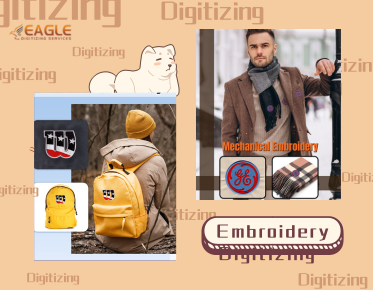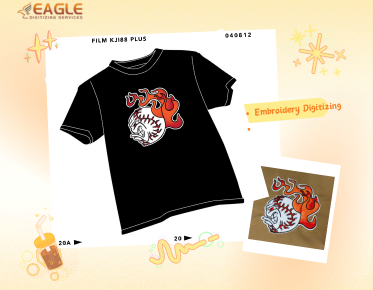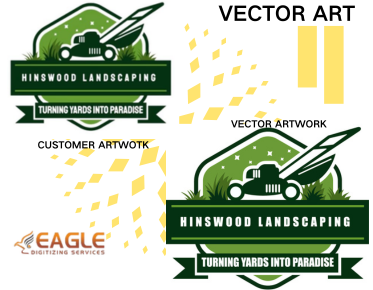Unlocking the Mystery of Pre-Programmed Templates in Digitized Embroidery
The artistry of embroidery has captivated people for centuries, tracing back to hand-stitched works of intricate design and detail. Today, technology has woven itself into this tradition, giving us the wonder of digitized embroidery and, notably, pre-programmed templates. These templates have reshaped the embroidery process, providing enthusiasts and professionals with pre-designed, versatile patterns that can be easily reproduced and adapted across projects.
Why Pre-Programmed Templates Are Game-Changers for Embroidery
Pre-programmed
templates take much of the guesswork and manual labor out of embroidery,
allowing creators to focus on the aspects that matter most: precision,
creativity, and quality. With just a few taps, a user can select a design,
tweak it to their liking, and bring it to life on a piece of fabric. The
result? A seamless blend of speed and quality, transforming embroidery from a
time-intensive craft into a streamlined process without losing its creative
heart.
The Basics of Pre-Programmed Templates
What
Exactly Are Pre-Programmed Templates?
Pre-programmed
templates are pre-designed digital files loaded into embroidery machines. These
templates contain specific stitch patterns and directions that the machine
follows precisely, forming designs ranging from simple patterns to elaborate
scenes. Each template acts as a “blueprint,” telling the embroidery machine
where to stitch, what sequence to follow, and how densely to stitch the fabric.
The
Difference Between Pre-Programmed Templates and Custom Designs
While
pre-programmed templates provide ready-to-use designs, customdesigns allow for personalized creations crafted from scratch. A
pre-programmed template offers convenience and consistency, whereas a custom
design offers boundless freedom. Both approaches have their place, but
templates are ideal for those who value efficiency, consistency, and the
ability to quickly reproduce high-quality designs.
How
Templates Simplify the Embroidery Process
Templates
eliminate the need for manual pattern setup, making the embroidery process
straightforward. By selecting a template, users sidestep the often complex and
laborious setup stages, allowing the machine to handle the intricate details
and enabling even novices to produce beautiful embroidered pieces with minimal
effort.
Types of Pre-Programmed Embroidery Templates
Standard
Designs for Everyday Use
Standard
templates are timeless patterns—think flowers, geometric shapes, and
nature-inspired designs—suitable for a variety of everyday items like clothing,
home linens, and accessories. They’re often versatile and adaptable, designed
to add a touch of elegance or charm to any project.
Seasonal
and Holiday Templates: Adding Festive Flair
From Halloween
ghosts to Christmas snowflakes, seasonal templates infuse projects with festive
cheer. They’re ideal for crafting holiday decorations, creating themed gifts,
or simply adding a touch of seasonal joy to everyday items.
Templates
for Special Occasions: Weddings, Birthdays, and More
Special occasions
deserve special designs. Templates for weddings, birthdays, and anniversaries
often feature themes like hearts, rings, and celebratory messages. These
templates are perfect for creating personalized keepsakes or adding a unique
touch to event decor.
Character
and Themed Templates for Kids and Fun Projects
Children’s
embroidery templates are all about whimsy and fun. Featuring popular cartoon
characters, animals, and playful themes, these templates are ideal for crafting
kid-friendly items like baby blankets, clothes, or room decor.
Benefits of Using Pre-Programmed Templates
Saving
Time Without Sacrificing Quality
With templates,
creators can achieve high-quality results in a fraction of the time, making
them invaluable for high-volume projects or those with tight deadlines.
Templates streamline the entire embroidery process without compromising on
design integrity or detail.
Consistency
in Large-Scale Projects
For projects that
require uniformity, such as company logos or bulk orders, pre-programmed
templates ensure each item is stitched to exact specifications. This
consistency is crucial for branding and for maintaining a professional,
polished look across a collection.
A
Confidence Booster for Embroidery Beginners
Embroidery can be
intimidating for newcomers, but templates offer a user-friendly entry point.
They provide the assurance that the final result will be professional,
encouraging beginners to explore embroidery without fear of making mistakes.
Where to Find Pre-Programmed Embroidery Templates
Exploring
Built-In Templates in Embroidery Machines
Many modern embroidery machines come with built-in templates,
giving users a variety of options right out of the box. These templates are
often designed to demonstrate the machine’s capabilities, from basic stitches
to complex patterns.
Top
Online Resources for High-Quality Templates
The internet is a
treasure trove of embroidery templates, with websites offering a range of
styles, themes, and levels of complexity. From free resources to premium
collections, users can easily find templates suited to their projects.
Free
vs. Paid Templates: What’s the Difference?
While free
templates are abundant, paid templates often provide unique, highly detailed
designs created by professional artists. Investing in a paid template can add a
special touch to a project, ensuring originality and intricate detail.
Choosing the Right Template for Your Project
How
to Match a Template to Your Fabric and Thread
Choosing the
right template involves considering fabric type and thread weight. Certain
templates may be better suited for heavier fabrics, while others work best on
lightweight materials. Matching template complexity to fabric helps ensure a
smooth, flawless design.
Design
Complexity: Picking a Template That Matches Your Skill Level
Beginners may
benefit from simpler designs that are forgiving and easy to follow. Experienced
users, on the other hand, may enjoy the challenge of a complex template that
allows for advanced techniques and precision.
Tips
for Customizing Pre-Programmed Templates to Make Them Your Own
Templates are a
starting point, but adding unique elements—like color changes or small design
tweaks—can make a project truly yours. Experimenting with custom touches
transforms pre-programmed designs into personalized pieces.
How to Load and Use Pre-Programmed Templates on Your Machine
Step-by-Step
Guide to Importing Templates into Your Embroidery Machine
Importing a
template is a straightforward process but may vary by machine. Generally,
templates are transferred via USB or direct upload. Once imported, the template
can be adjusted for positioning and size to fit the specific project needs.
Understanding
File Formats: DST, PES, and More
Embroiderytemplates come in various file formats, each compatible with specific machines.
DST, PES, and other formats carry unique stitch information, so knowing your
machine’s compatible formats is key to successful template use.
Troubleshooting
Template Loading Issues
Occasionally,
issues arise when loading templates. Common fixes include checking file
compatibility, updating machine software, or ensuring that the file is properly
formatted.
Editing and Modifying Pre-Programmed Templates
Basic
Adjustments: Size, Position, and Rotation
Pre-programmed
templates can be a foundation, but sometimes even the most perfectly crafted
designs need adjustments to suit the project at hand. Basic modifications like
resizing, repositioning, and rotating allow the design to be tailored to the
specific dimensions of a garment or item. These simple tweaks not only give
flexibility but also ensure that the embroidery fits seamlessly into the final
look of the piece.
Adding
Personal Touches: Monograms and Additional Details
Nothing says
“custom” quite like a personalized monogram or unique detail added to a
template. Adding initials, names, or small embellishments transforms a generic
design into a one-of-a-kind creation. This customization option is especially
popular for gifts, special events, and home decor. By layering small personal
touches onto pre-designed templates, users can craft pieces that feel genuinely
individual and meaningful.
Using
Embroidery Software to Make Advanced Edits
For those ready
to dive deeper, embroidery software offers a
realm of advanced editing possibilities. With software, users can modify stitch
types, layer multiple elements, or even combine aspects from several templates
into one cohesive design. This advanced editing capability opens doors to more
intricate customization, letting creators push the boundaries of standard
templates and produce unique, professional-grade embroidery.
Tips for First-Time Users of Pre-Programmed Templates
Starting
Simple: Why Less Is More for Your First Project
Embroidery may
look easy with the right tools, but jumping into a complex design as a first
project can be overwhelming. Starting with a simple template helps beginners
understand the process, get comfortable with their machine, and build confidence.
Basic templates often yield stunning results and allow new users to master
foundational skills before moving on to more complex designs.
Common
Mistakes and How to Avoid Them
Many first-time
users face common pitfalls, such as incorrect thread tension, poor alignment,
or choosing overly detailed templates. To avoid these mistakes, take time to
thoroughly review the machine’s manual, test designs on practice fabric, and
focus on precision over speed. By understanding these common issues ahead of time,
beginners can sidestep frustrations and enjoy a smoother creative experience.
Quick
Practice Runs: Perfecting the Template Before the Final Stitch
Practice makes
perfect in embroidery, too. Before stitching on the final fabric, running a
quick practice stitch-out on a similar material helps identify any potential
issues and gives a preview of how the design will look. Practice runs allow
users to fine-tune their machine settings and confirm the look, feel, and scale
of the design, ensuring a polished final piece.
Popular Embroidery Machines with the Best Pre-Programmed Templates
Top
Brands Known for Their Impressive Template Libraries
Certain brands are renowned for
their extensive template libraries, offering diverse designs ranging from
traditional to modern. Machines from brands like Brother, Janome, and Bernina
feature robust libraries that cater to various styles and needs, giving users an impressive selection and ensuring quality
stitching with each design.
Features
to Look for in Machines if Templates Are a Priority
When selecting an
embroidery machine with templates in mind, consider features like memory
capacity, connectivity, and editing capabilities. Machines with ample storage,
Wi-Fi capabilities for easy template downloads, and built-in editing tools
offer greater flexibility for template customization, ensuring smooth project
flow from start to finish.
How
to Access Template Updates and New Additions
Many embroidery
machines support periodic updates, allowing users to access new templates or
even download fresh designs from the brand’s website. Staying updated with
these options not only expands creative possibilities but also keeps users in
step with current trends and techniques in embroidery.
Customizing Pre-Programmed Templates for Personal Projects
Tips
for Adding Names, Dates, and Special Messages
Adding names,
dates, or messages transforms a pre-programmed design into a treasured
keepsake. Many templates feature blank spaces or simple backgrounds ideal for
adding these personalized touches, whether for commemorating an event or making
a gift more meaningful.
Turning
a Template into a Unique Gift Idea
With a little
creativity, a standard template can become a one-of-a-kind gift. From
customizing colors to adding special elements, small adjustments personalize
the design to the recipient. Personalized home decor, wearable items, or memory
quilts make heartfelt gifts that reflect effort, thoughtfulness, and
originality.
How
to Make Your Projects Stand Out with Simple Modifications
Small
modifications go a long way. Experimenting with thread colors, altering design
placement, or even adding small embellishments like beads or sequins can
elevate a project. These thoughtful changes ensure that even with
pre-programmed templates, each project shines with individuality and
distinction.
Pre-programmed templates in digitized embroidery open up a world of creative expression. They blend tradition with modernity, helping beginners and seasoned embroiderers alike bring stunning designs to life effortlessly. By embracing these templates, enhancing them with personal touches, and pushing creative boundaries, each project becomes more than just embroidery—it’s an art form shaped by individuality, creativity, and the magic of technology.



